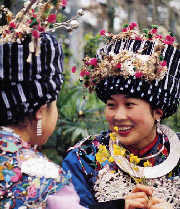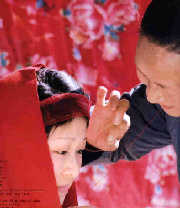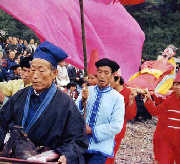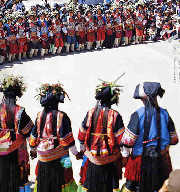Ritual Ballads
 Ritual ballads are those sung on such occasions as sacrifices, marriage, blessings, and rituals to avert misfortune. As many rituals become out of date and forgotten and then die out with the change of social life, their ballads suffer from the danger of extinction. Therefore, the folklore values of these ballads are highly treasured.
Ritual ballads are those sung on such occasions as sacrifices, marriage, blessings, and rituals to avert misfortune. As many rituals become out of date and forgotten and then die out with the change of social life, their ballads suffer from the danger of extinction. Therefore, the folklore values of these ballads are highly treasured.
According to the function of rituals, ritual ballads roughly fall into four categories: sacrifice, etiquette and custom (including marriage, burial, house-building, birthday the third day and 100th day of a new-born), seasons and festivals, and Meishu (a sacrifice ritual).
Most of China's ethnic communities are polytheistic. They believe in different gods and goddesses such as the Gods of Heaven and Earth, Goddess of Wind, Goddess of Lightening, God of Mountain, Local Guardian God, God of Trees and God of Wells. People hold different rituals to worship them and the sacrificial prayers are ritual ballads.
 China is a land of rituals and ceremonies, where etiquettes of inter-personal communications are highly valued. This gives rise to a wide range of ritual ballads, among which marriage is an important one with a lot of rituals.
China is a land of rituals and ceremonies, where etiquettes of inter-personal communications are highly valued. This gives rise to a wide range of ritual ballads, among which marriage is an important one with a lot of rituals.
There are different kinds of rituals for marriage. From match-making, engagement, dowry preparing, wedding weeping, bride greeting, formal bows to heaven and earth, entering the bridal chamber, to the bride's home visit at the 3rd day of marriage, different sequences are accompanied by different fixed rituals. Every ritual, conveying specific wishes, expectations and blessings, naturally entails a variety of ritual ballads and singing opportunities. Among the ritual marriage ballads, the most sentimental and moving ones are for "wedding weeping", represented by "My Cousin Sister" and "Mum's Dearest Daughter" ofSichuan Province, and "Wedding Weeping Song" ofShanghai.
House-building was also of great importance for a household in the past. There are a set of rituals for the site choosing, beam selecting, wall building, beam putting, gate making, and house-warming celebrations, accompanied by congratulatory songs.
 There are many traditional festivals in China, and each ethnic community has its own unique ones. Take the Han people for instance; there areSpring Festival(i51 of Ist lunar month),Lantern Festival(15th of Ist lunar month), Pure Brightness Festival,Dragon Boat Festival(5th lunar month), Spirit Festival (15th of 7th lunar month),Mid-Autumn Festival(15th of 8th lunar month),Double Ninth Festival(9th of 9th lunar month), Seeing-off Kitchen God Festival (23rd of 12th lunar month) and more.
There are many traditional festivals in China, and each ethnic community has its own unique ones. Take the Han people for instance; there areSpring Festival(i51 of Ist lunar month),Lantern Festival(15th of Ist lunar month), Pure Brightness Festival,Dragon Boat Festival(5th lunar month), Spirit Festival (15th of 7th lunar month),Mid-Autumn Festival(15th of 8th lunar month),Double Ninth Festival(9th of 9th lunar month), Seeing-off Kitchen God Festival (23rd of 12th lunar month) and more.
There are 24 solar terms in a Chinese lunar year, each of which has its seasonal temperature change and farming activities, as well as ballad songs. For the Han people, the most exciting festivals are Shehuo (Merry-Making Festivities) before the Spring Festival, and the Lantern Festival (15th of Ist lunar month), which are all highlighted by many ballads. Among other ethnic festivals and ballads, the Torchlight Festival of the Yi ethnic group and Water-Splashing Festival of the Dai ethnic group are also world known.
Love Ballads
 |
|
"Circle Dance", Tibetan Flowerpickign Festival in Baima, Wnxian County from Gansu Vulume
|
Love ballads, reflecting love and marriage, are embodiment of the varying emotions and thoughts of men and women in love.
From the literary point of view, the artistic value of love songs ranks top among ballads and there are many love ballad classics which strike us. The reason why these ballads are moving and popular is that they are full of passion and are a call for the deepest love. The good love ballads have similar characteristics: they are moving, passionate and witty with vivid metaphors.
Of course, love ballads usually express the love between men and women at different stages: first meeting, admiring, feeling out, falling in love, passionate love, engagement, wedding, marital change, rejecting marriage, seeing off lover and so forth. The styles vary by region and personality: some of which are gentle, honest, and implicit; some are explicit and straightforward; some are bold and witty.
Though ballad singers are often not very learned, and some are even illiterate, they are good at different rhetorical devices such as description, personification, figures of speech, partial tone, pun, etc. They express their love delicately by means of natural phenomena such as the sun, the moon, the stars, mountains, rivers, grass, trees, birds, animals, etc., which is ingenious and amazing.
